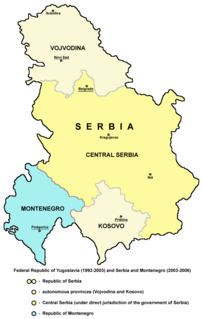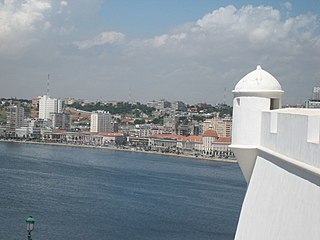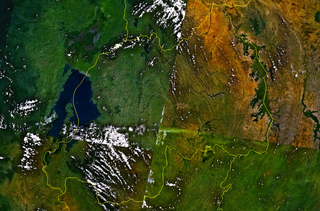| UN Security Council Resolution 813 | |
|---|---|
Liberian capital Monrovia | |
| Date | 26 March 1993 |
| Meeting no. | 3,187 |
| Code | S/RES/813 (Document) |
| Subject | Liberia |
Voting summary | 15 voted for None voted against None abstained |
| Result | Adopted |
| Security Council composition | |
Permanent members | |
Non-permanent members | |
United Nations Security Council Resolution 813, adopted unanimously on 26 March 1993, after reaffirming Resolution 788 (1992) and determining that the situation in Liberia constituted a threat to international peace and security, the Council condemned the failure of the parties in the country – the Armed Forces of Liberia, ULIMO, National Patriotic Front of Liberia and Independent National Patriotic Front of Liberia among others, to implement the Yamoussoukro IV Accord. [1]

United Nations Security Council resolution 788, adopted unanimously on 19 November 1992, after determining that the deterioration of the situation in Liberia constituted a threat to international peace and security, the Council imposed an arms embargo on the country for the purposes of establishing peace and stability.

Liberia, officially the Republic of Liberia, is a country on the West African coast. It is bordered by Sierra Leone to its northwest, Guinea to its north, Ivory Coast to its east, and the Atlantic Ocean to its south-southwest. It covers an area of 111,369 square kilometers (43,000 sq mi) and has a population of around 4,700,000 people. English is the official language and over 20 indigenous languages are spoken, representing the numerous ethnic groups who make up more than 95% of the population. The country's capital and largest city is Monrovia.

The Armed Forces of Liberia (AFL) are the armed forces of the Republic of Liberia. Tracing its origins to a militia that was formed by the first black colonists in what is now Liberia, it was founded as the Liberian Frontier Force in 1908, and retitled in 1956. For almost all of its history, the AFL has received considerable materiel and training assistance from the United States. For most of the 1941–89 period, training was largely provided by U.S. advisers, though this assistance has not prevented the same generally low levels of effectiveness common to most of the armed forces in the developing world.
Contents
The Council welcomed the report of the Secretary-General Boutros Boutros-Ghali and his appointment of Trevor Gordon-Somers as Special Representative for Liberia, and commended the efforts of the Organisation of African Unity and Economic Community of West African States (ECOWAS) to help restore stability in Liberia, reaffirming the belief that the Yamoussoukro IV Accord offers the best possible framework for a peaceful resolution of the Liberian civil war. It also condemned attacks on the peacekeeping forces and the violation of the ceasefire, calling on all parties to implement the Accord.

Boutros Boutros-Ghali was an Egyptian politician and diplomat who was the sixth Secretary-General of the United Nations (UN) from January 1992 to December 1996. An academic and former Vice Foreign Minister of Egypt, Boutros-Ghali oversaw the UN at a time when it dealt with several world crises, including the breakup of Yugoslavia and the Rwandan genocide. He was then the first Secretary-General of the Organisation internationale de la Francophonie from 16 November 1997 to 31 December 2002.

The Organisation of African Unity was established on 25 May 1963 in Addis Ababa, Ethiopia with 32 signatory governments. It was disbanded on 9 July 2002 by its last chairperson, South African President Thabo Mbeki, and replaced by the African Union (AU). Some of the key aims of the OAU were to encourage political and economic integration among member states, and to eradicate colonialism and neo-colonialism from the African continent. Although it achieved some success, there were also differences of opinion as to how that was going to be achieved.

The Economic Community of West African States, also known as ECOWAS, is a regional economic union of fifteen countries located in West Africa. Collectively, these countries comprise an area of 5,114,162 km2 (1,974,589 sq mi), and in 2015 had an estimated population of over 349 million.
The resolution called upon all Member States to abide by the arms embargo on the country imposed under Chapter VII of the United Nations Charter, demanding that all parties co-operate with United Nations and ECOWAS personnel, proposing to consider against parties that are unwilling to co-operate. It also commended the efforts of Member States and international organisations for their humanitarian efforts in Liberia.
An arms embargo is an embargo that applies solely to weaponry, and may also apply to "dual-use technology". An arms embargo may serve one or more purposes:
Chapter VII of the United Nations Charter sets out the UN Security Council's powers to maintain peace. It allows the Council to "determine the existence of any threat to the peace, breach of the peace, or act of aggression" and to take military and nonmilitary action to "restore international peace and security".

Humanitarian aid is material and logistic assistance to people who need help. It is usually short-term help until the long-term help by government and other institutions replaces it. Among the people in need are the homeless, refugees, and victims of natural disasters, wars and famines. Humanitarian aid is material or logistical assistance provided for humanitarian purposes, typically in response to humanitarian crises including natural disasters and man-made disaster. The primary objective of humanitarian aid is to save lives, alleviate suffering, and maintain human dignity. It may therefore be distinguished from development aid, which seeks to address the underlying socioeconomic factors which may have led to a crisis or emergency. There is a debate on linking humanitarian aid and development efforts, which was reinforced by the World Humanitarian Summit in 2016. However, the approach is viewed critically by practitioners.
Resolution 813 concluded by requesting the Secretary-General to:
- (a) consider the possibility of convening a meeting of the President of the Interim Government of National Unity and the warring factions;
- (b) discuss with ECOWAS and the parties concerned the contribution which the United Nations could make in support of the implementation of the Yamoussoukro IV Accord and possible deployment of observers; [2]
- (c) report back to the Security Council on the implementation of the current resolution as soon as possible.















